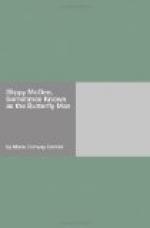I could not bear to look at his closed rooms, but turned my head aside as I passed them. Disconsolate Kerry barked at my passing step, and pawed frantically at the window, but I made no effort to release him. What comfort had I for the faithful creature, deserted by what he most loved?
His dismal outcries rasped my nerves raw; it was exactly as if the dog howled for the dead. And that John Flint was dead I had no reasonable cause to doubt. He was dead because Slippy McGee was alive. That thought drove me as with a whip out into the garden, for as black an hour as I have ever lived through—the sort of hour that leaves a scar upon the soul. The garden was very still, steeped and drowsing in the bright clear sunlight; only the bees were busy there, calling from flower-door to flower-door, and sometimes a vireo’s sweet whistle fluted through the leaves. Pitache lay on John Flint’s porch, and dozed with his head between his paws; Judge Mayne’s Panch sat on the garden fence, and washed his black face, and watched the little dog out of his emerald eyes. All along the fences the scarlet salvia shot up its vivid spikes, and when the wind stirred, the red petals fell from it like drops of blood.
It seemed to me incongruous and cruel that one should suffer on such a day; grief is for gray days; but the sunlight mocks sorrow, the soft wind makes light of it. I was out of tune with this harmony, as I walked up and down with my rosary in my hand. I knew that every flying minute took him farther and farther away from me and from hope and happiness and honor, and brought him nearer and nearer to the whirlpool and the pit. I beat my hands together and the crucifix cut into my palms. I walked more rapidly, as if I could get away from the misery within. My heart ached intolerably, a mist dimmed my sight, and a hideous choking lump rose in my throat; and it seemed to me that, old and futile and alone, I was set down, not in my garden, but in the midst of the abomination of desolation.
Through this aching desolation Kerry’s cries stabbed like knife-thrusts.... And then little Pitache lifted his head, cocked a listening ear and an alert eye, perked up his black nose, thumped an expressive tail, and barked. It was a welcoming bark; Kerry, hearing it, stiffened statue-like at the window and fell to whining in his throat. The garden gate had clicked.
Dreading that any mortal eye should see me thus in my grief, knowing it was beyond my power of endurance to meet calmly or to speak coherently with any human being at that moment, I turned, with the instinct of flight strong upon me. I knew I must be alone, to face this thing in its inevitableness, to fight it out, to get my bearings. The gate was turning upon its hinges; I could hear it creak.




